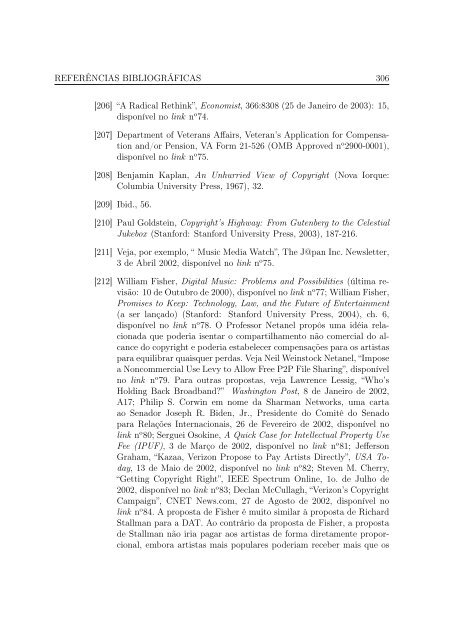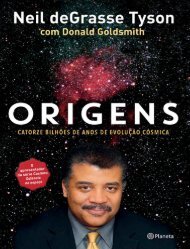- Page 3:
Cultura Livre Lawrence Lessig Tradu
- Page 7 and 8:
Sumário Prefácio da versão Brasi
- Page 9:
v SUMÁRIO B Eles, logo 257 B.1 Mai
- Page 13 and 14:
Prefácio da versão Brasileira Por
- Page 15 and 16:
Prefácio No final de sua crítica
- Page 17:
xiii Prefácio Essa idéia e um dos
- Page 21 and 22:
3 Em 17 de Dezembro de 1903, em uma
- Page 23 and 24:
5 menos três ocasiões, Armstrong
- Page 25 and 26:
7 perda da habilidade de retransmis
- Page 27 and 28:
9 partilham cultura caíram no alca
- Page 29 and 30:
11 nobreza é estranha à nossa tra
- Page 31:
13 para mudar a lei — e mais impo
- Page 35 and 36:
17 Desde a concepção das leis que
- Page 37:
19 lei é cada vez menos apoiar a c
- Page 40 and 41:
22 O parceiro de Disney na época,
- Page 42 and 43:
24 ao copyright. [22] Isso quer diz
- Page 44 and 45:
Unidos foram muito parecidos com o
- Page 46 and 47:
criatividade Waltdisneyana é vista
- Page 48 and 49:
30 Instruções da Kodak: “O prin
- Page 50 and 51:
32 infrações ao “direto de imag
- Page 52 and 53:
34 guiadas não é uma coisa óbvia
- Page 54 and 55:
36 de vídeo para uma criança e (.
- Page 56 and 57:
Mas apenas eleições não fazem um
- Page 58 and 59:
link de satélite de um repórter n
- Page 60 and 61:
A mesma coisa acontece também com
- Page 62 and 63:
44 cionários tenham acesso a mater
- Page 64 and 65:
46 tados. Um de seus tios era um ad
- Page 67 and 68:
Capítulo 4 “Piratas” Se podemo
- Page 69 and 70:
51 “Piratas” aos compositores d
- Page 71 and 72:
53 “Piratas” detentores de dire
- Page 73 and 74:
55 “Piratas” Douglas Anello, ad
- Page 75 and 76:
Capítulo 5 “Pirataria” Existe
- Page 77 and 78:
59 “Pirataria” mente sai sem pa
- Page 79 and 80:
61 “Pirataria” 5.2 Pirataria
- Page 81 and 82:
63 “Pirataria” Vamos começar d
- Page 83 and 84:
65 “Pirataria” “baixar uma m
- Page 85 and 86:
67 “Pirataria” era suficiente.
- Page 87 and 88:
69 “Pirataria” iriam mostrar ma
- Page 89:
71 “Pirataria” na lei, ao mesmo
- Page 93:
75 Os defensores do copyright estã
- Page 96 and 97:
e Julieta estaria livre em 1731. En
- Page 98 and 99:
80 provocados por favores para inte
- Page 100 and 101:
competir baseado no fato de que, pe
- Page 102 and 103:
84 sideradas propriedades foram red
- Page 104 and 105:
ele deveria contactar a Gracie Film
- Page 106 and 107:
88 e litigiar contra você até te
- Page 108 and 109:
90 guntou, “Bem, qual é o proble
- Page 110 and 111:
92 “Absolutamente. Eu acredito qu
- Page 112 and 113:
Para alguns, essas histórias ofere
- Page 115 and 116:
Capítulo 9 Colecionadores Em abril
- Page 117 and 118:
99 Colecionadores “duzentos e tri
- Page 119 and 120:
101 Colecionadores qualquer um ou s
- Page 121:
103 Colecionadores possa parecer, o
- Page 124 and 125:
106 mente de Washington. Ao defende
- Page 126 and 127:
108 tem nenhuma obrigação de paga
- Page 128 and 129:
110 pela comunidade, não (ou pelo
- Page 130 and 131:
10.1 Por que Hollywood está certa
- Page 132 and 133:
10.1 Por que Hollywood está certa
- Page 134 and 135:
10.1 Por que Hollywood está certa
- Page 136 and 137:
10.3 Lei: Duração 118 garantir qu
- Page 138 and 139:
10.3 Lei: Duração 120 no regime f
- Page 140 and 141:
10.4 Lei: Escopo 122 arquitetura. D
- Page 142 and 143:
10.4 Lei: Escopo 124 são controlad
- Page 144 and 145:
10.5 Lei e Arquitetura: Alcance 126
- Page 146 and 147:
10.5 Lei e Arquitetura: Alcance 128
- Page 148 and 149:
10.5 Lei e Arquitetura: Alcance 130
- Page 150 and 151:
10.6 Arquitetura e Lei: Força 132
- Page 152 and 153:
10.6 Arquitetura e Lei: Força 134
- Page 154 and 155:
10.6 Arquitetura e Lei: Força 136
- Page 156 and 157:
10.6 Arquitetura e Lei: Força 138
- Page 158 and 159:
10.6 Arquitetura e Lei: Força 140
- Page 160 and 161:
10.6 Arquitetura e Lei: Força 142
- Page 162 and 163:
10.6 Arquitetura e Lei: Força 144
- Page 164 and 165:
10.7 Mercado: Concentração 146 co
- Page 166 and 167:
10.7 Mercado: Concentração 148 A
- Page 168 and 169:
10.7 Mercado: Concentração 150 in
- Page 170 and 171:
10.8 Juntos 152 sua mensagem. Uma m
- Page 172 and 173:
10.8 Juntos 154 gama de direitos, c
- Page 174 and 175:
10.8 Juntos 156 história do capít
- Page 177 and 178:
Capítulo 11 Quimera Em uma histór
- Page 179 and 180:
161 Quimera servidor de P2P, isso p
- Page 181:
163 Quimera gunta. As forças de me
- Page 184 and 185:
12.1 Engessamento do processo criat
- Page 186 and 187:
12.1 Engessamento do processo criat
- Page 188 and 189:
12.2 Engessando a inovação 170 Es
- Page 190 and 191:
12.2 Engessando a inovação 172 co
- Page 192 and 193:
12.2 Engessando a inovação 174 co
- Page 194 and 195:
12.2 Engessando a inovação 176 pr
- Page 196 and 197:
12.2 Engessando a inovação 178 16
- Page 198 and 199:
12.3 Corrompendo os cidadãos 180 A
- Page 200 and 201:
12.3 Corrompendo os cidadãos 182 t
- Page 202 and 203:
12.3 Corrompendo os cidadãos 184 p
- Page 204 and 205:
12.3 Corrompendo os cidadãos 186 i
- Page 207:
189 Portanto, aqui temos uma imagem
- Page 210 and 211:
192 quer outra pessoa. Algumas empr
- Page 212 and 213:
194 seus períodos de copyright amp
- Page 214 and 215:
196 restringido o poder do Congress
- Page 216 and 217:
198 de forma muito profunda o desen
- Page 218 and 219:
200 feitos entre 1921 e 1951. Apena
- Page 220 and 221:
202 de um sebo, e quando um sebo o
- Page 222 and 223:
204 não haveria limites para o pod
- Page 224 and 225:
206 argumentos de um grupo de maluc
- Page 226 and 227:
208 economistas. Os memorandos do o
- Page 228 and 229:
210 consistentemente argumentou sob
- Page 230 and 231:
212 manhã, não havia uma única c
- Page 232 and 233:
214 Como professor, e não como adv
- Page 234 and 235:
216 Esses dois juizes entenderam to
- Page 236 and 237:
218 tínhamos todas as provas que s
- Page 238 and 239:
Figura 13.1: Quadrinho de Ruben Bol
- Page 240 and 241:
222 ou o “Copyright Term Deregula
- Page 242 and 243:
224 e porque isso permite que os di
- Page 244 and 245:
226 me contou, informou à congress
- Page 246 and 247:
228 do lado dos Causbys e exige seu
- Page 249 and 250:
231 Há mais de 25 milhões de pess
- Page 251 and 252:
233 condição de adquirirem as dro
- Page 253 and 254:
235 reforçadas pelas RCAs de nosso
- Page 255 and 256:
237 código aberto equivale a uma c
- Page 257 and 258:
239 missão da WIPO. O domínio pú
- Page 259 and 260:
241 resses dos mais poderosos. Pode
- Page 261:
Parte VII Epílogo 243
- Page 265 and 266:
Apêndice A Nós, Agora O bom senso
- Page 267 and 268:
249 Nós, Agora bre o que você est
- Page 269 and 270:
251 Nós, Agora ada pela Free Softw
- Page 271 and 272:
253 Nós, Agora nossa tradição é
- Page 273 and 274: 255 Nós, Agora licença Creative C
- Page 275 and 276: Apêndice B Eles, logo Nós não ir
- Page 277 and 278: 259 Eles, logo Mas é sempre surpre
- Page 279 and 280: 261 Eles, logo copyrights, por exem
- Page 281 and 282: 263 Eles, logo B.3 Uso Livre versus
- Page 283 and 284: 265 Eles, logo a killer app 3 da In
- Page 285 and 286: 267 Eles, logo lhe conteúdo na hor
- Page 287 and 288: 269 Eles, logo básica da indústri
- Page 289 and 290: 271 Eles, logo A - garantias dos di
- Page 291: 273 Eles, logo é precisamente o qu
- Page 295: 277 Através do texto, há referên
- Page 298 and 299: REFERÊNCIAS BIBLIOGRÁFICAS 280 [1
- Page 300 and 301: REFERÊNCIAS BIBLIOGRÁFICAS 282 [2
- Page 302 and 303: REFERÊNCIAS BIBLIOGRÁFICAS 284 [5
- Page 304 and 305: REFERÊNCIAS BIBLIOGRÁFICAS 286 us
- Page 306 and 307: REFERÊNCIAS BIBLIOGRÁFICAS 288 1,
- Page 308 and 309: REFERÊNCIAS BIBLIOGRÁFICAS 290 [9
- Page 310 and 311: REFERÊNCIAS BIBLIOGRÁFICAS 292 [1
- Page 312 and 313: REFERÊNCIAS BIBLIOGRÁFICAS 294 de
- Page 314 and 315: REFERÊNCIAS BIBLIOGRÁFICAS 296 [1
- Page 316 and 317: REFERÊNCIAS BIBLIOGRÁFICAS 298 qu
- Page 318 and 319: REFERÊNCIAS BIBLIOGRÁFICAS 300 de
- Page 320 and 321: REFERÊNCIAS BIBLIOGRÁFICAS 302 [1
- Page 322 and 323: REFERÊNCIAS BIBLIOGRÁFICAS 304 (W
- Page 327: Parte IX Reconhecimentos & Agradeci
- Page 330 and 331: 312 baraçosamente grande. Enquanto
- Page 333: 315 Lawrence Lessig http://www.less




